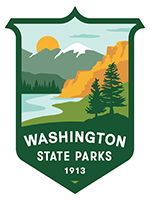Press Release
July 17, 2024
Fourth-annual Gathering of the Eagles celebrates intergenerational cultural heritage of Coast Salish
Media contact
| Name | Sarah Fronk |
|---|---|
| Department | Communications |
| media@parks.wa.gov | |
Lhaq'temish Land/Territory — In May, five canoes traveled ancestral highways through land and water in many of the traditional homelands of the Coast Salish People.
Esqalph etse Kwelengsen, or “Gathering of the Eagles” in the Xwlemi dialect of the Lummi People, is an inter-tribal canoe journey hosted with the permission of Kwelengsen elders. The fourth-annual journey was a celebratory reflection on the “olden days” when canoes traveled these same waters for gatherings and celebrations.
The Washington State Parks and Recreation Commission is honored to lift the voices of the Indigenous People who gathered for Esqalph etse Kwelengsen. Though State Parks is the current steward of some of these lands, these are the Traditional lands of Lummi Nation since time immemorial. As an Indigenous ally, State Parks is privileged to use its platform to share these stories in partnership with event co-founder and organizer Sul ka dub (Freddie Lane).
“We are all about bridge-building between communities, educating our neighbors and sharing and caring in the "Spirit of the Potlatch" that has now returned,” Sul ka dub said.
The journey was completed by five canoes including the Octopus Canoe (Carvers Camp), Chief Leschi Schools, the Kingfisher of Orcas (Xwlemi') canoe families and two canoes from the Hawaiian Voyaging Canoe Society.
"Within the Salish Sea, we recognize that many of our tribes have different dialects and languages and we also have our own individual customs, traditions and beliefs when it comes to our families and clan," Sul ka dub said. "We share a common ancestral highway, which is the Salish Sea. When the tide is out, our table is set. This is what we protect as a part of our sacred duty to Mother Earth."
As the canoe families traveled, communities along their route hosted potlatch-style gatherings with donated food, cultural exchanges, storytelling, meditation, prayer circles, traditional songs and dances, and some arts and crafts vendors and gift-making.
The canoe journey left from Anacortes and made landings at:
- Fidalgo and Lopez (Spencer Spit State Park) islands on May 19
- San Juan Island on May 20
- Shaw and Orcas (Moran State Park) islands on May 22
- Lummi Island and the Island of Chachusen (Lummi Reservation) on May 24
- Squalicum Creek in Bellingham on May 25
The landing at Squalicum Creek also included a celebration of Coast Salish Day. After their journey, paddlers completed an additional eight-mile pull from the Lummi Stommish Grounds to downtown Bellingham to join the arts and culture street fair in Maritime Heritage Park. This included a Welcoming Ceremony, protocol (cultural exchanges), food, storytelling, music and sla-hal games.
The 2024 Esqalph etse Kwelengsen closed on May 26 with a clam and oyster bake hosted in partnership with the Alliance of Earth, Sky and Water Protectors. During the gathering, the community joined together for a speaker series where Tribal and community leaders led discussions about indigenous knowledge, climate change and strategies about how the community can be better protectors of the lands, waters and, most importantly, Schelangen, meaning “our way of life.”
"This is my annual pilgrimage, this is my Mecca," Navajo Elder Esther Yazzie-Lewis said. “Our gathering celebrates intergenerational cultural heritage of all peoples, not just us Indigenous. We come here on a grassroots journey sharing the old ways of the potlatch gathering that was once banned by the governments of Canada and the United States. But look at how resilient our Indigenous people are – we see all these customs and traditions returning to their rightful place...amongst the people. That's resilience."
Such a successful Esqalph etse Kwelengsen would not be possible without the support of the volunteers and community members who gathered supplies and offered their time to ensure the paddlers, Tribal elders and families were cared for and fed. Tribal and non-tribal people from across the islands and coast donated gifts, food, vehicles and transportation and a helping hand wherever one was needed.
Sul ka dub gives special thanks to Friends of the San Juans, Children of the Setting Sun Productions, Orcas Island Community Foundation, Friends of the Canoe Landings at Lopez Island, the Buffum Group, Nimiipuu: Protecting the Environment, Port of Lopez Island, Friday Harbor and Bellingham, Bellingham Mayor Kim Lund, Bellingham Parks and Recreation, Sandy and Uuva Taylor of Orcas Island and the individual donors who made Esqalph etse Kwelengsen possible.
